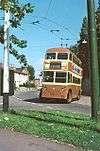Trolleybuses in Doncaster
| Operation | |
|---|---|
| Locale | Doncaster, South Yorkshire, England |
| Open | 22 August 1928 |
| Close | 14 December 1963 |
| Status | Closed |
| Routes | 6 |
| Operator(s) | Doncaster Corporation Transport |
| Infrastructure | |
| Stock | 47 (maximum) |
The Doncaster trolleybus system once served the town of Doncaster, South Yorkshire, England. Opened on 22 August 1928,[1][2] it gradually replaced the Doncaster Corporation Tramways.
Original system
By the standards of the various now-defunct trolleybus systems in the United Kingdom, the Doncaster system was a moderately sized one, with a total of 6 routes, and a maximum fleet of 47 trolleybuses.[2] There were routes to Bentley (a loop), Beckett Road, Wheatley Hills, Racecourse/Hyde Park (another loop), Balby, and Hexthorpe, all radiating out from the city centre.
The Bentley route was the first to close, on 12 February 1956.[3] The Beckett Road route was the last to close, on 14 December 1963.[1][2]
One of the former Doncaster trolleybuses, a Roe-bodied Karrier W4,[4] is now preserved, at the Trolleybus Museum at Sandtoft, Lincolnshire.[5]
Doncaster Racecourse experiment
%2C_28_August_2011.jpg)
In 1984, the South Yorkshire Passenger Transport Executive (SYPTE) sponsored the building of an experimental trolleybus, in connection with plans to reintroduce trolleybuses on four bus routes in Doncaster and two in Rotherham.[6][7] This vehicle had a chassis built by Hestair Dennis, adapted from the standard Dennis Dominator chassis.[7] The body was based on the Alexander 80 seat body, adapted with trolleybooms.[3][4] Unusually for a British trolleybus, it included an auxiliary diesel engine (a 48 hp 3DA Dorman) for moving away from traction wires.[7][8] It had a GEC Traction traction motor and was capable of running at 40 miles per hour (64 km/h).[7]
Power was supplied to the overhead (erected by Balfour Beatty) at 600V DC from a substation at the nearby SYPTE Leicester Road depot.[8]
Testing began in August 1985, on a mile-long test route alongside Doncaster Racecourse.[7] This went from a turning circle at the end of the (private) Sandall Beat Road, alongside the racecourse, and then across Leger Way into the SYPTE bus depot.[3] On at least one occasion it operated a revenue-earning passenger service,[3] and the vehicle is reported to have proved satisfactory in operation.[7]
The project was shelved in 1986 due to bus deregulation as this would mean any trolleybuses would have no protection from competing operators, and the wiring was removed in September 1993.[3][9]
After the experiment finished, the vehicle was preserved, and as of 2016 is at the Trolleybus Museum at Sandtoft awaiting electrical repairs.[4]
See also
References
Notes
- 1 2 Joyce, J.; King, J. S.; and Newman, A. G. (1986). British Trolleybus Systems, pp. 51–55, 159. London: Ian Allan Publishing. ISBN 0-7110-1647-X.
- 1 2 3 Short, Peter. "Former UK systems". British Trolleybus Society. Retrieved 9 April 2011.
- 1 2 3 4 5 Lockwood, Stephen (2011). Trackless to Trolleybus: Trolleybuses in Britain. Adam Gordon. ISBN 978 1 874422 86 0.
- 1 2 3 "Vehicles". Trolleybus Museum at Sandtoft.
- ↑ Zebedee, John (26 April 2015). "A List of Preserved Trolleybuses in the UK". British Trolleybus Society. Retrieved 31 August 2016.
- ↑ Bushell, Chris; Stonham, Peter, eds. (1988). Jane's Urban Transport Systems (7th ed.). Jane's Transport Press. ISBN 0 7 106-0854-3.
- 1 2 3 4 5 6 Lumb, Geoff (1995). British Trolleybues, 1911-1972. Ian Allan Ltd. ISBN 0 7110 2347 6.
- 1 2 "Trolleybus starts days at races". Commercial Motor. 20 July 1985. Retrieved 25 August 2016.
- ↑ Russell, Michael (2014). The Colours of Yesteryear's Trolleybuses. Crowthorne: Capital Transport Publishing. p. 210. ISBN 9781854143860.
Further reading
- Barker, Colin (2011). Doncaster Trolleybuses. Midhurst, West Sussex, UK: Middleton Press. ISBN 978-1-906008-92-5.
- Buckley, Richard (2003). Trams and Trolleybuses in Doncaster. Barnsley, South Yorkshire, UK: Wharncliffe. ISBN 978-1-903425-29-9.
- Cockshott, John; Heard, Mike (1964). Doncaster Corporation Transport. London: PSV Circle; Omnibus Society. OCLC 505168869.
- Tuffrey, Peter (2010). Doncaster's Electric Transport. Stroud, Gloucestershire, UK: Amberley. ISBN 978-1-4456-0116-8.
External links
![]() Media related to Buses in South Yorkshire at Wikimedia Commons
Media related to Buses in South Yorkshire at Wikimedia Commons
- SCT'61 website - photos and descriptions of Doncaster trolleybuses and early motorbuses
- National Trolleybus Archive
- British Trolleybus Society, based in Reading
- National Trolleybus Association, based in London
